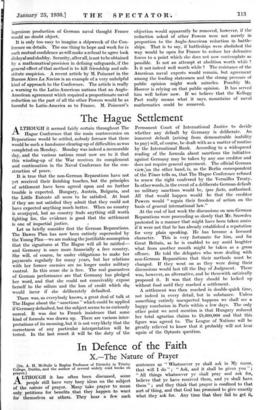The Hague Settlement
ALTHOUGH it seemed fairly certain throughout The Hague Conference that the main controversies on Reparations would be settled, nobody foresaw that there would be such a handsome clearing-up of difficulties as was completed on Monday. Monday was indeed a memorable day, and the various nations must now see to it that this winding-up of the War receives its complement and continuation in the Naval Conference for the con- struction of peace.
It is true that the non-German Reparations have not yet received their finishing touches, but the principles of settlement have been agreed upon and no further trouble is expected. Hungary, Austria, Bulgaria, and the Little Entente all seem to be satisfied. At least if they are not satisfied they admit that they could not have expected anything much better. When no country is overjoyed, but no country finds anything still worth fighting for, the evidence is good that the settlement is one of impartial justice.
Let us briefly consider first the German Reparations. The Dawes Plan has now been entirely superseded by the Young Plan—we are making the justifiable assumption that the signatures at The Hague will all be ratified— and Germany is once more financially a free country. She will, of course, be under obligations to make her payments regularly for many years, but her relations with her former enemies are no longer under military control. In this sense she is free. The real guarantees of German performance are that Germany has pledged her word, and that she could not conceivably expose herself to the odium and the loss of credit which she would incur if she deliberately defaulted.
There was, as everybody knows, a great deal of talk at The Hague about the " sanctions " which could be applied if Germany defaulted, but the subject seems to us curiously unreal. It was due to French insistence that some kind of formula was drawn up. There are various inter- pretations of its meaning, but it is not very likely that the correctness of any particular interpretation will be tested. In the last resort it will be the duty of the Permanent Court of International Justice to decide whether any default by Germany is deliberate. An innocent default (arising from demonstrable inability to pay) will, of course, be dealt with as a matter of routine by the International Bank. According to a widespread reading of the formula about sanctions the initiative against Germany may be taken by any one creditor and does not require general agreement. The official German viewZon the other hand, is, as the Berlin correspondent of the Times tells us, that The Hague Conference refused to renew the right conferred by the Versailles Treaty. In other words, in the event of a deliberate German default no military sanctions would be, ipso facto, authorized. All that would happen would be that the creditor Powers would " regain their freedom of action on the basis of general international law."
At the end of last week the discussions on non-German Reparations were proceeding so slowly that Mr. Snowden protested in a manner that might have been taken amiss if it were not that he has already established a reputation for very plain speaking. He has become a licensed character. This is very fortunate for him, and for Great Britain, as he is enabled to say amid laughter what from another mouth might be taken as a gross offence. He told the delegates who were dealing with non-German Reparations that their methods must be changed. If they went on as they were doing their discussions would last till the Day of Judgment. There was, however, an alternative, and he therewith satirically proposed it. It was that they should be locked up without food until they reached a settlement.
A settlement was then reached in double-quick time, not indeed in every detail, but in substance. Unless something entirely unexpected happens we shall see a happy conclusion in Paris within a few days. The only other point we need mention is that Hungary reduced her total agrarian claims to £9,600,000 and that this figure was agreed to. The League of Nations will be greatly relieved to know that it probably will not hear again of the Optants question.






































 Previous page
Previous page